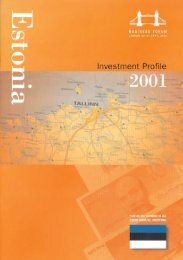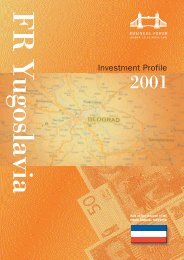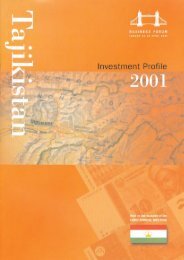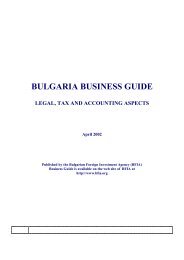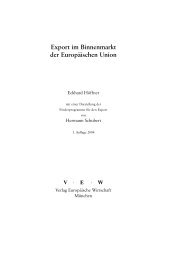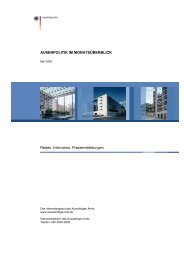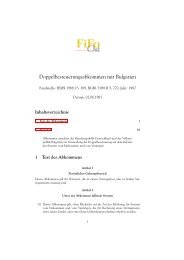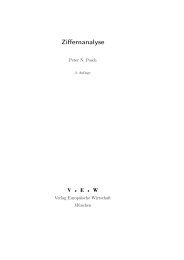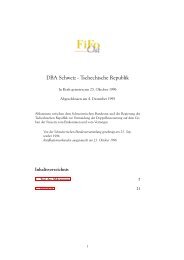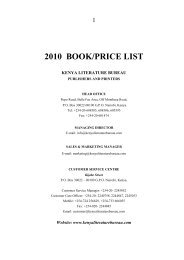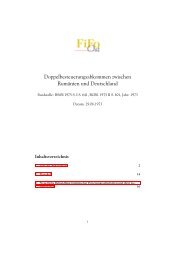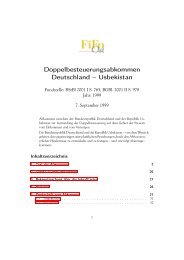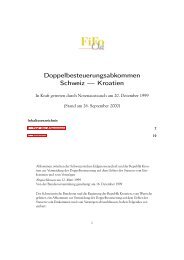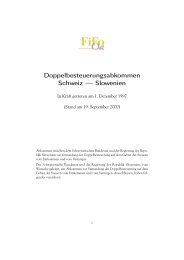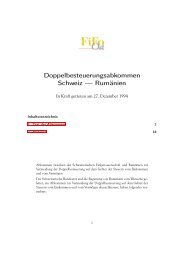Introduction - FiFo Ost
Introduction - FiFo Ost
Introduction - FiFo Ost
You also want an ePaper? Increase the reach of your titles
YUMPU automatically turns print PDFs into web optimized ePapers that Google loves.
Investment climate<br />
The level of foreign direct investment in Croatia is favourable in comparison to other countries in the region. The new<br />
government has been moving decisively to encourage FDI. As a result FDI inflows jumped sharply in 1999-2000, mainly due to<br />
large privatisation deals. With the improvement of the general economic climate in Croatia and the return of stability to the<br />
region, greenfield investments are expected to pick up in the near future.<br />
Foreign direct investment<br />
Total FDI<br />
US$ millions, cash receipts, net<br />
The cornerstone of Croatia's 1600<br />
1400<br />
new economic reform<br />
1200<br />
programme is liberalisation<br />
1000<br />
of the foreign investment<br />
800<br />
environment. The new<br />
600<br />
government, understanding<br />
400<br />
200<br />
that FDI can contribute to<br />
0<br />
restructuring efforts,<br />
’93 ’94 ’95 ’96 ’97 ’98 ’99 ’00 ’01<br />
est. proj.<br />
improvement of competitiveness Source: Ministry of Finance of the<br />
Republic of Croatia, January 2001<br />
and job creation, is determined<br />
to increase FDI levels and has taken concrete steps to enhance<br />
Croatia's attractiveness to foreign investors. In 2000, the<br />
following measures were taken to improve the investment<br />
environment: introduction of investment incentive legislation,<br />
reduction of payroll and corporate taxes, revision of the<br />
privatisation framework, and the drafting of plans for the<br />
liberalisation of the telecommunications and energy sectors.<br />
FDI inflows reached an unprecedented high in 1999 (US$<br />
1,439 million) when they received a one-off boost with the<br />
privatisation of Hrvatske Telekomunikacije (HT), and continued<br />
to be relatively high in 2000 as well (US$ 750 million).<br />
Despite the recent success in attracting FDI, Croatia still ranks<br />
among the middle group with respect to cumulative per capita<br />
FDI inflows, as compared to other advanced transition<br />
economies. In the past, foreign investment was deterred by<br />
regional instability and the unwelcoming attitude of the previous<br />
regime towards foreign businesses.<br />
In 2000, FDI was particularly boosted by the proceeds of the<br />
privatisation of three banks: Rijecka Banka, Splitska Banka and<br />
Privredna Banka Zagreb. The latter deal alone accounted for<br />
inflow of € 300 million. Forthcoming privatisations will create the<br />
most immediate opportunities in the banking, insurance, energy,<br />
and telecommunications sectors. (See Privatisation below.)<br />
FDI has mostly been concentrated in large privatisation deals in<br />
previous years. The largest foreign investment to date was the<br />
purchase in 1999 by Deutsche Telekom of a 35 per cent stake<br />
in Hrvatske Telekomunikacije (HT) for US$ 850 million. Other<br />
Foreign direct<br />
investment by sector<br />
1993-2000 Q3, per cent<br />
Other 29<br />
Telecommunications 25<br />
Two<br />
Financial<br />
intermediation 22<br />
Extraction of<br />
crude petroleum<br />
and natural gas 3<br />
Pharmaceuticals 21<br />
Italy<br />
Austria<br />
Slovenia<br />
Adriatic Sea<br />
Croatia<br />
Other 26.4<br />
Hungary<br />
Bosnia-<br />
Herzegovina<br />
Foreign direct<br />
investment by origin<br />
1993-June 2000, per cent<br />
Source: Croatian Chamber of Economy<br />
Yugoslavia<br />
major deals involved two issues of shares in Pliva, the largest<br />
pharmaceuticals company, in 1996 and 1998, which may be<br />
regarded as FDI rather than portfolio investment, because the<br />
shares were distributed in the form of depository receipts.<br />
The sectors that have proven most popular with foreign<br />
investors include telecommunications, the cement industry,<br />
gas exploration and distribution, pharmaceuticals, food and<br />
drinks, and tourism. The leading countries from which FDI<br />
has originated are the USA, Germany, Austria, Italy and<br />
the Netherlands.<br />
Top foreign investors<br />
Two<br />
Netherlands 3.4<br />
Austria 23.4<br />
US 24<br />
Germany 22.8<br />
Company Country Sector Size of investment<br />
US$m<br />
Deutsche Telekom Germany Telecommunications 850.00<br />
Pliva d.d USA Pharmaceutical 731.32<br />
Privredna Banka Zagreb Italy Finance 297.00<br />
Siemens Germany Electronics 130.19<br />
Zagrebacka Banka USA Finance 81.36<br />
Ina-Agip d.o.o. Italy Petrochemical 75.08<br />
Coca Cola Beverages Australia, Netherlands Soft-drinks bottling 55.52<br />
Dalmacijacement UK Cement 48.01<br />
Ciglane Bedekovcina Austria Construction 46.74<br />
Source: Croatian Chamber of Commerce<br />
Croatia Investment Profile 7



